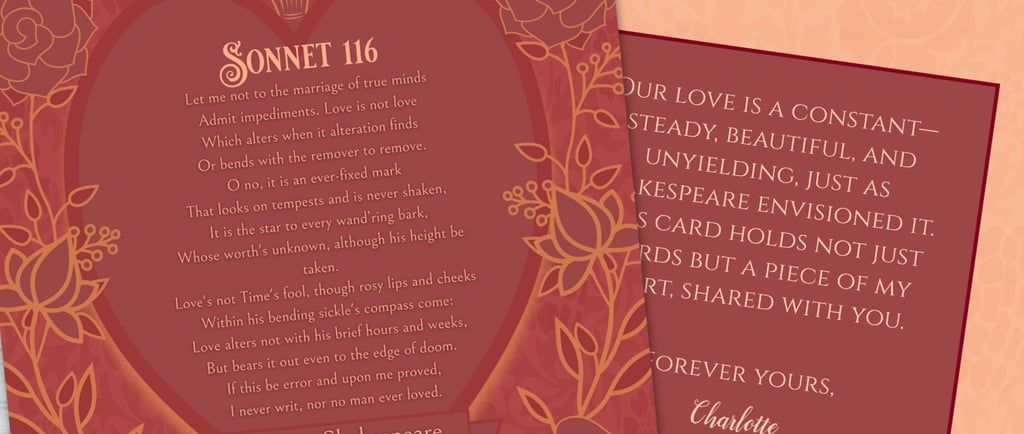Is This Romantic or Toxic? Classic Words Through a Modern Lens
There's something undeniably alluring about romantic quotes from classic literature. They've been etched into Valentine's cards, whispered between lovers, and immortalized in countless films. But what happens when we strip away the flowery language and historical context to examine these sentiments through a modern lens? Are these declarations truly romantic, or do they reveal something more problematic? Let's dive into some of literature's most celebrated "romantic" quotes and ask ourselves: is this actually romantic, or are we detecting notes of toxicity?Blog post description.
Rosalind Fairfax
5/18/20254 min read


Shakespeare's Love Language: Timeless or Troubling?
"I would not wish any companion in the world but you." - The Tempest
Modern Take: This quote from Prospero's daughter Miranda to Ferdinand seems genuinely sweet. Expressing that someone is your preferred companion above all others acknowledges their unique value in your life. In healthy relationships, partners do genuinely enjoy each other's company above others.
Verdict: Romantic ✓ This sentiment translates well to modern relationships, provided it doesn't lead to isolation from friends and family.
"Love is not love which alters when it alteration finds." - Sonnet 116
Modern Take: Shakespeare's assertion that true love remains constant despite changes is both beautiful and problematic. While commitment through adversity is admirable, this quote could be misinterpreted to mean you should stay in a relationship regardless of how it or your partner changes.
Verdict: Complicated ⚠️ Healthy love involves adapting to changes together, not ignoring them. This quote requires nuance in modern application.
"But love, first learned in a lady's eyes, lives not alone immured in the brain, but, with the motion of all elements, courses as swift as thought in every power, and gives to every power a double power, above their functions and their offices." - Love's Labour's Lost
Modern Take: Behind the elaborate language, Shakespeare is describing infatuation's all-consuming power—how attraction can overwhelm rational thought. While this accurately describes the neurochemical rush of new love, idealizing this state can lead to overlooking red flags.
Verdict: Proceed with Caution ⚠️ The intensity described is real, but modern relationship wisdom suggests not making major decisions while in this heightened emotional state.
"Did my heart love till now? Forswear it, sight! For I ne'er saw true beauty till this night." - Romeo and Juliet
Modern Take: Romeo's declaration upon seeing Juliet embodies the "love at first sight" trope. While instant attraction exists, mistaking it for deep love can be problematic. Romeo had been dramatically pining for another woman mere hours before.
Verdict: Potentially Toxic ❌ This represents infatuation rather than love, and the tendency to idealize new partners while devaluing previous connections is a red flag in modern dating.
Beyond Shakespeare: Other Classics Under Scrutiny
"He's more myself than I am. Whatever our souls are made of, his and mine are the same." - Emily Brontë, Wuthering Heights
Modern Take: Catherine's passionate declaration about Heathcliff sounds intense and romantic, but it represents an unhealthy fusion of identities. Modern relationship psychology emphasizes maintaining individual identity within partnerships.
Verdict: Toxic ❌ This quote romanticizes codependency and enmeshment, concepts we now recognize as harmful relationship dynamics.
"You are sunlight through a window, which I stand in, warmed. My darling." - Jessie Burton, The Miniaturist
Modern Take: This contemporary but classically styled quote expresses appreciation for how a loved one enhances the speaker's life without suggesting possession or control.
Verdict: Romantic ✓ This sentiment acknowledges the positive impact of love while maintaining healthy boundaries.
"If equal affection cannot be, let the more loving one be me." - W.H. Auden
Modern Take: Auden acknowledges relationship imbalances can exist and volunteers to be the one who loves more. While seemingly selfless, this perspective could enable one-sided relationships.
Verdict: Complicated ⚠️ Loving generously is beautiful, but equally balanced affection should be the goal in healthy relationships.
"I could die for you. But I couldn't, and wouldn't, live for you." - Ayn Rand, The Fountainhead
Modern Take: This quote subverts typical romantic declarations by rejecting the notion of living solely for another person. It advocates for maintaining autonomy while still valuing the relationship deeply.
Verdict: Surprisingly Healthy ✓ Despite Rand's controversial philosophy, this quote aligns with modern views on maintaining individuality within relationships.
When Possession Masquerades as Passion
"You are mine. I am yours. From this day on, you must be sure of this. You must know nothing can change that." - Shakespeare, Anthony and Cleopatra
Modern Take: This possessive declaration sounds romantic in poetry but raises concerns about autonomy and consent in modern relationships. The absolute nature of "nothing can change that" disregards personal growth and freedom of choice.
Verdict: Potentially Toxic ❌ Healthy modern relationships recognize both partners as autonomous individuals who choose to be together.
"If I can't have her, no one can." - Common literary trope
Modern Take: This sentiment appears in countless works and has been normalized in popular culture, but it's a classic expression of controlling behavior and entitlement.
Verdict: Definitely Toxic ❌ This mindset underlies many real-world cases of stalking and intimate partner violence.
What Makes Love Healthy in Modern Terms?
Our examination reveals several key differences between classical and modern views of romance:
Autonomy vs. Possession: Modern healthy relationships prioritize mutual respect for individual autonomy over possessive declarations.
Partnership vs. Worship: Equal partnership has replaced pedestalization as the relationship ideal.
Growth vs. Constancy: Modern love allows both partners to evolve rather than remaining static.
Communication vs. Grand Gestures: Today's healthy relationships value ongoing honest communication over dramatic one-time declarations.
The Verdict
Many "romantic" quotes from classic literature don't translate well to modern relationship standards. While beautiful as poetry, they often romanticize dynamics we now recognize as unhealthy. However, some timeless sentiments still resonate with contemporary values of mutual respect, support, and genuine partnership.
Perhaps the most romantic notion of all is one rarely expressed in classic literature: the idea that love should bring out the best in both people, supporting individual growth while creating something greater together than either could achieve alone.
What's your favorite classic quote about love? Do you see it differently after reading this? Share your thoughts in the comments below!
This post is part of our "Classic Words. Modern Vibes." series examining timeless literature through contemporary perspectives.
